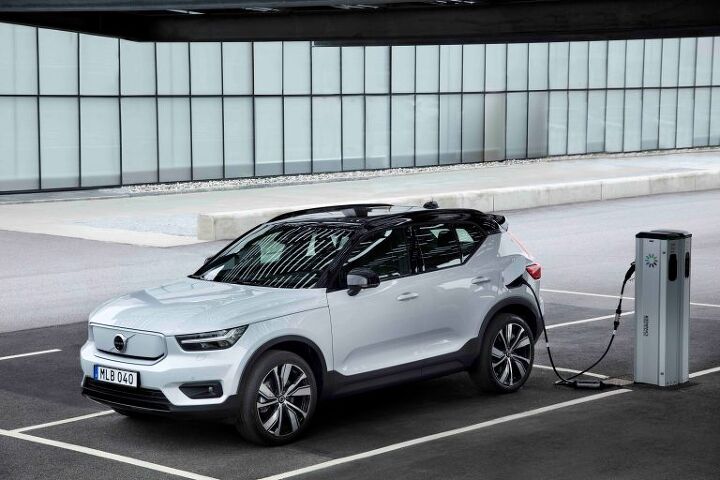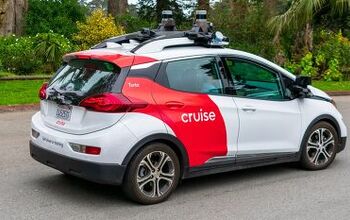Volvo CEO Says Governments Should Just Ban Gasoline Powered Cars

Volvo Cars’ chief executive, Håkan Samuelsson, believes a ban on gasoline-driven vehicles would be a more effective way to force groups to go electric than continuing to offer subsidies on battery-powered automobiles. The announcement comes as part of the Financial Times’ “Future of the Car Summit,” where Samuelsson will proclaim the internal combustion engine “a technology of the past.”
In related news, Volvo Cars is also in negotiations to merge with China’s Geely Automotive and has renewed its commitment toward becoming an electric-only brand by 2030. The latter issue will also be brought up during Wednesday’s Car Summit, with the CEO praising the United Kingdom’s promise to eliminate the sale of new gasoline and diesel cars that same year.
What miraculously convenient timing.
Volvo believes it will be attributing 50 percent of its sales to EVs by 2025, with the rest being hybridized to some degree. But it’s vying to be totally electric by 2030, even if we’re inclined to believe that target is quite ambitious. But Samuelsson believes the luxury segment will absolutely outpace the automobiles of commoners in terms of electrification, making the 2030 goal possible for higher-end brands.
“We are convinced that the premium car segment will become fully electric over time, and our ambition is to be a leader in that segment,” reads his speech.
From FT:
The digital summit comes as carmakers face a faster-than-expected push towards electric vehicles, with other countries expected to bring in phase-out dates for the sale of new traditionally powered vehicles.
Reception of the UK’s phase-out of new petrol and diesel sales has been muted across the industry, with many carmakers warning that the targets are too ambitious without a widespread public adoption of the technology.
Allowing the sale of some hybrid cars until 2035 will ease the burden for some carmakers such as Toyota, which are heavily reliant on hybrid models to lower their emissions.
Regulation is already driving down emissions, with most carmakers in the EU bringing out battery models to meet tighter CO2 rules that came into force this year and 2021. A lower goal by 2030 is expected to lead to a large increase in electric vehicle sales across Europe.
But Volvo’s CEO doesn’t think subsidies will be enough.
“No one can build a successful and profitable business by relying on incentives,” Samuelsson explains in his speech. “While temporary incentives can help encourage industry to develop in the right way, it could be more efficient for governments to set a clear agenda towards an electric future.”
It seems to have worked for Tesla … but whatever.
In the interim, Volvo plans on resuming merger talks with China’s Geely. Unfortunately, Geely’s attempts to be listed on Shanghai’s New Star Market currently limit the changes its legally allowed to make to its capital structure. Volvo said this could all change after the holidays, however. The Swedish brand is currently parented by Zhejiang Geely Holding Group, which owns the London EV Company, Lotus, Lynk & Co, Geely Auto, Geely Sweden AB, and Geely UK.
“Quarter one is more realistic next year. We have said we are looking at a combination and it could be done in different ways. Platform sharing and so on,” Samuelsson told Reuters this week, noting that the goal would be to maintain both of the brands’ unique identities in the event of a full merger.
[Image: Volvo Cars]

A staunch consumer advocate tracking industry trends and regulation. Before joining TTAC, Matt spent a decade working for marketing and research firms based in NYC. Clients included several of the world’s largest automakers, global tire brands, and aftermarket part suppliers. Dissatisfied with the corporate world and resentful of having to wear suits everyday, he pivoted to writing about cars. Since then, that man has become an ardent supporter of the right-to-repair movement, been interviewed on the auto industry by national radio broadcasts, driven more rental cars than anyone ever should, participated in amateur rallying events, and received the requisite minimum training as sanctioned by the SCCA. Handy with a wrench, Matt grew up surrounded by Detroit auto workers and managed to get a pizza delivery job before he was legally eligible. He later found himself driving box trucks through Manhattan, guaranteeing future sympathy for actual truckers. He continues to conduct research pertaining to the automotive sector as an independent contractor and has since moved back to his native Michigan, closer to where the cars are born. A contrarian, Matt claims to prefer understeer — stating that front and all-wheel drive vehicles cater best to his driving style.
More by Matt Posky
Latest Car Reviews
Read moreLatest Product Reviews
Read moreRecent Comments
- Dave M. IMO this was the last of the solidly built MBs. Yes, they had the environmentally friendly disintegrating wiring harness, but besides that the mechanicals are pretty solid. I just bought my "forever" car (last new daily driver that'll ease me into retirement), but a 2015-16 E Class sedan is on my bucket list for future purchase. Beautiful design....
- Rochester After years of self-driving being in the news, I still don't understand the psychology behind it. Not only don't I want this, but I find the idea absurd.
- Douglas This timeframe of Mercedes has the self-disintegrating engine wiring harness. Not just the W124, but all of them from the early 90's. Only way to properly fix it is to replace it, which I understand to be difficult to find a new one/do it/pay for. Maybe others have actual experience with doing so and can give better hope. On top of that, it's a NH car with "a little bit of rust", which means to about anyone else in the USA it is probably the rustiest W124 they have ever seen. This is probably a $3000 car on a good day.
- Formula m How many Hyundai and Kia’s do not have the original engine block it left the factory with 10yrs prior?
- 1995 SC I will say that year 29 has been a little spendy on my car (Motor Mounts, Injectors and a Supercharger Service since it had to come off for the injectors, ABS Pump and the tool to cycle the valves to bleed the system, Front Calipers, rear pinion seal, transmission service with a new pan that has a drain, a gaggle of capacitors to fix the ride control module and a replacement amplifier for the stereo. Still needs an exhaust manifold gasket. The front end got serviced in year 28. On the plus side blank cassettes are increasingly easy to find so I have a solid collection of 90 minute playlists.


































Comments
Join the conversation
I have to say, I am disappointed by most of the comments here. I have to (somewhat begrudgingly) agree with Håkan Samuelsson, both in practice, and in principle. From a practical perspective, BEVs are superior in almost every metric. Let's just break it down to a few points: 1. For BEV owners, "range anxiety" is vanishing very quickly. First of all, it's a false narrative promoted by players who have something to lose as EVs gain dominance, and propogated by people who have been convinced by this onslaught. Second, as EV range expands to greater-than 500 km, even the long-distance road trips become painless. Most drivers (and this data is publicly available) desire or require a so-called "bio break" after less than 4 hours of driving. In most areas (even Montana, USA), there are sufficient L2 or better public charging stations _already_ for these scenarios. Using the high speed networks that are being rapidly deployed, these "bio breaks" can be as short as 15 minutes. Couple this with the rapid development of higher charging speeds and greater range, and it's already become a non-issue for most EV owners. Granted, there certainly are rare cases where someone misjudges their range, but I honestly don't understand how that happens. Anyway, even in those cases, many roadside assistance programs now include EV services such as "virtual jerry cans" to get a stranded driver to a charging station. 2. The myth of power grid strain is just that, a myth. Most EV drivers charge their vehicles using "smart" charging options such as over night off-peak charging, etc. Many EV charging stations include local power generation by way of solar and local storage. As grid-level storage comes online, these perceived issues evaporate. Ramping up power generation is a comparatively trivial issue. 3. Arguments about the environmental footprint of EVs often centre around some half-truths and some myths. While some EVs might have a greater manufacturing footprint than a comparable ICEv (even that is debatable), the fact is that as grid generation reduces its footprint so then does the EVs powered by it. Not so with ICEvs; in fact, ICEvs generally become less efficient over time, and over its lifetime will almost invariably have a much higher environmental footprint than the EV. Meanwhile, EV battery packs that become damaged or otherwise lose efficiency cen be refurbished & repurposed for grid-level storage. 3. EVs are silent; noise pollution is a real problem, not just in urban areas. EVs stand to be one of the single most effective reductions in noise pollution worldwide. 4. The physics of the electric motor provide much greater towing capacity, and thus as battery storage technologies ramp up, so too does their utility for moving heavy loads. This applies both to heavy freight as well as to recreational purposes. This, in turn, will reduce traffic hazards, for example, in mountainous zones during vacation seasons. If a vehicle is capable of towing its RV up a steep hill with no, or very little loss in speed, then fewer dangerous manoevers by other drivers will occur, etc. Obviously I could go on and on, but if this gets any longer no one will read it. As it is, that's already probably the case. Long story short, Electric vehicles are absolutely the future, and any manufacturer that doesn't realize this is going to be left in the cold. I applaud Volvo and their forward thinking here. Meanwhile, I'm drooling over the Polestar Precept.
If (and that's a big IF) this plan even has an iota of potential to come to fruition, has anyone considered that not only does support/supply infrastructure need to be drastically improved, but so does the disposal process for these batteries that are going to be flooding the roadways? Everyone always talks about the benefits to the environment, the increasing ease of use, the dwindling drawbacks of EV's, but seldom does the topic come up of "What the hell do we do with all of these batteries that can't be easily recycled?" EV car batteries have to be replaced what, every 5-7 years if the Institute of Energy Research is correct?